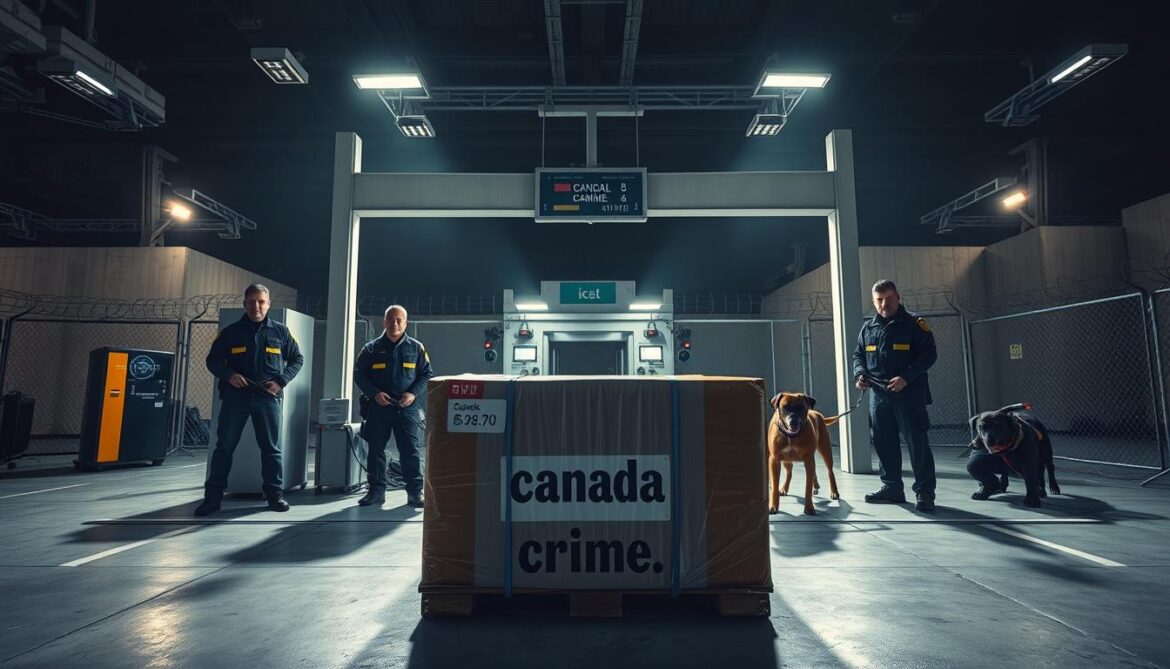Between 2018 and 2020, Canada stopped over 900 illegal drug exports. This shows how crucial controlled substances export prevention is. If you’re an exporter, knowing and following Canadian export regulations is key to obeying the law.
The Controlled Drugs and Substances Act (CDSA) bans exporting certain drugs without a permit. As an exporter, you need a permit for each shipment. Health Canada checks that these substances are used right and stops illegal activities. Learn more by checking out Health Canada’s guide on controlled substances and precursors.
Using strong narcotic export prevention strategies is crucial. It helps you stay out of legal trouble and supports worldwide health and safety. Keep reading for tips on how to handle these rules well.
Understanding the Risks of Exporting Controlled Substances
Exporting controlled substances involves many risks. It’s crucial to know the legal issues, impact on global relations, and health and safety concerns.
Legal Ramifications
Without proper permission, exporting controlled substances can have serious legal results. You could face criminal charges, large fines, and jail time. These legal issues may also limit your travel and freedom.
Impact on International Relations
Illegal export activities can damage a country’s diplomatic ties. Nations fighting drug trafficking might place sanctions or entry restrictions for violations. This could harm both individuals and companies in the long term.
Health and Safety Risks
The wrong handling and illegal distribution of controlled substances pose big health risks. These actions can cause public health emergencies due to misuse and overdoses. Following the rules closely is vital for public health and safety.
Identifying Controlled Substances
Knowing which substances are controlled is essential for following the law and keeping people safe. Controlled substances are regulated to avoid misuse. It’s crucial to identify them correctly to meet Health Canada’s rules.
Common Examples
Controlled substances range from addictive narcotics to various chemicals. Common examples include:
- Opioids such as morphine and oxycodone
- Cannabinoids like THC and CBD
- Stimulants including cocaine and amphetamines
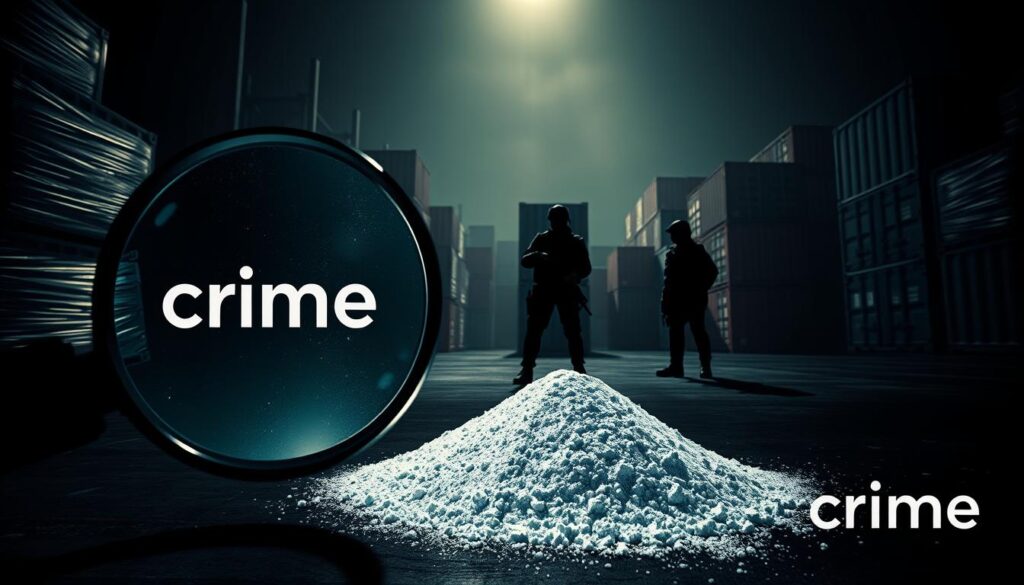
Legal Definitions
The legal definitions of these substances can be found in different laws. In Canada, the Controlled Drugs and Substances Act (CDSA) explains this in detail. This act sorts substances into categories based on their abuse potential, medical use, and legal status.
Health Canada’s Controlled Substances Schedules
Health Canada has a Schedule that organizes controlled substances. This Schedule categorizes drugs from most strictly regulated to less so. Following these categories helps fulfill legal obligations and prevent illegal drug trade.
Tips to Prevent Exportation of Controlled Substances
To stop controlled substances from being exported illegally, you must know what you’re responsible for. It’s also vital to follow important steps to stay safe and follow the law.
Know Your Responsibilities as an Exporter
First off, as an exporter, you need to keep up with the laws for handling controlled substances. Understanding these laws will help you avoid legal trouble. Make sure you know how to comply with these rules so you don’t unintentionally break the law.
Secure Storage Practices
It’s critical to use secure drug storage methods. Controlled substances should be kept in a place that’s locked and watched over. This keeps the substances safe and makes it easier to keep track of them.
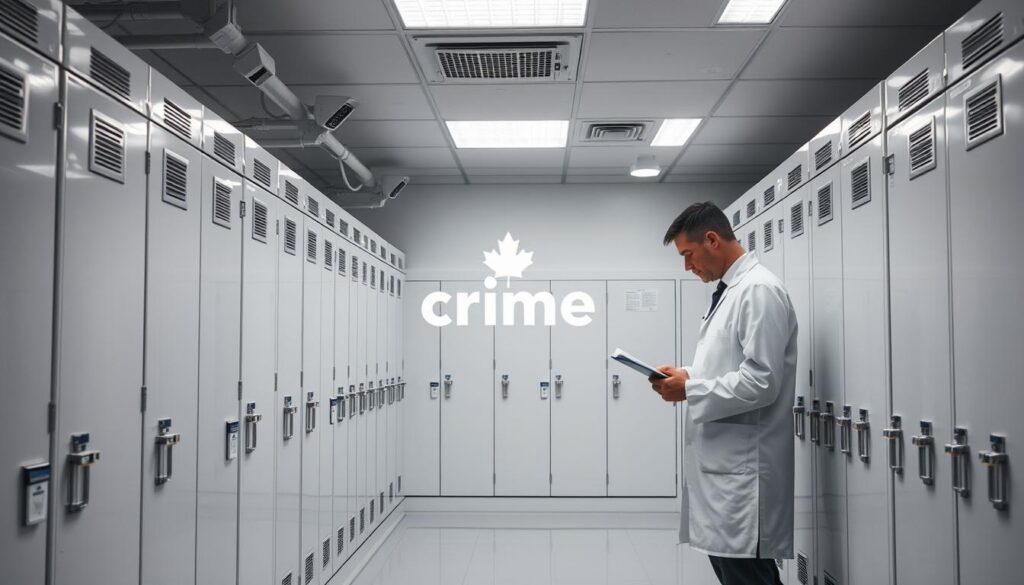
Strict Documentation and Record Keeping
Keeping detailed records is very important. You should log everything about getting, storing, and giving out controlled substances. Good record-keeping practices help you follow the law and find any mistakes easily.
- Update your inventory logs regularly.
- Ensure accurate and complete documentation for every transaction.
- Audit records periodically to confirm accuracy and compliance.
By using these export compliance tips, exporters can follow the law and lower the risk of mismanaging controlled substances.
Importance of Compliance with International Regulations
Following international rules is key for exporters of controlled substances. It ensures your operations stay legal and secure.
Laws and Regulations in Destination Countries
Different countries have different rules for importing controlled substances. It’s crucial to know the regulations in your target country. Following these laws keeps you out of trouble and keeps your business’s good name.
It’s important to understand and follow these specific legal requirements. This is part of your strategy to avoid global export problems.
International Drug Trafficking Prevention Standards
The world has strict standards to stop drug trafficking. You need to know these standards to stay compliant. The WHO, UNODC, and other groups offer important guidelines to follow.
Keeping up with these international compliance standards avoids legal issues. It also helps in the fight against illegal drugs.
Penalties for Non-Compliance
The penalties for illegal drug export are tough and differ by place. They can include big fines, jail time, and harm to your business’s reputation. Staying compliant is not just about avoiding trouble. It’s also about building trust with international partners.

| Country | Regulation Body | Key Regulations | Penalties for Non-Compliance |
|---|---|---|---|
| United States | DEA (Drug Enforcement Administration) | Controlled Substances Act | Fines, Imprisonment |
| Canada | Health Canada | Controlled Drugs and Substances Act | Fines, Imprisonment |
| Germany | BfArM (Federal Institute for Drugs and Medical Devices) | Narcotics Act | Fines, Imprisonment |
| Japan | PMDA (Pharmaceuticals and Medical Devices Agency) | Narcotics and Psychotropics Control Act | Fines, Imprisonment |
Customs Compliance for Controlled Substances
Making sure you follow the right rules for exporting controlled substances is vital. It helps keep up with regulations and avoids serious penalties. Always stick to the set guidelines to ensure legal and easy crossing of borders.
Canada Border Services Agency Guidelines
The Canada Border Services Agency asks you to stick to specific rules when exporting controlled substances. You’ll need detailed paperwork, clear labels, and to follow certain drug transport rules. This careful process fits with Canadian law and helps prevent illegal drug trade.
Required Export Declarations
When exporting, it’s important to list all details about the substances. This includes what they are, how much, and where they’re going. Getting this right helps you follow Canada Border Services Agency rules and avoids delays or legal issues.
Procedures for Declaring Controlled Substances
To easily get controlled substances through customs, follow these important steps:
- Prepare a detailed manifest including a description and the quantity of each controlled substance.
- Ensure all packaging is labeled according to controlled drug transport regulations, specifying the nature of contents clearly.
- Submit all necessary forms and documents to the appropriate agencies ahead of shipment.
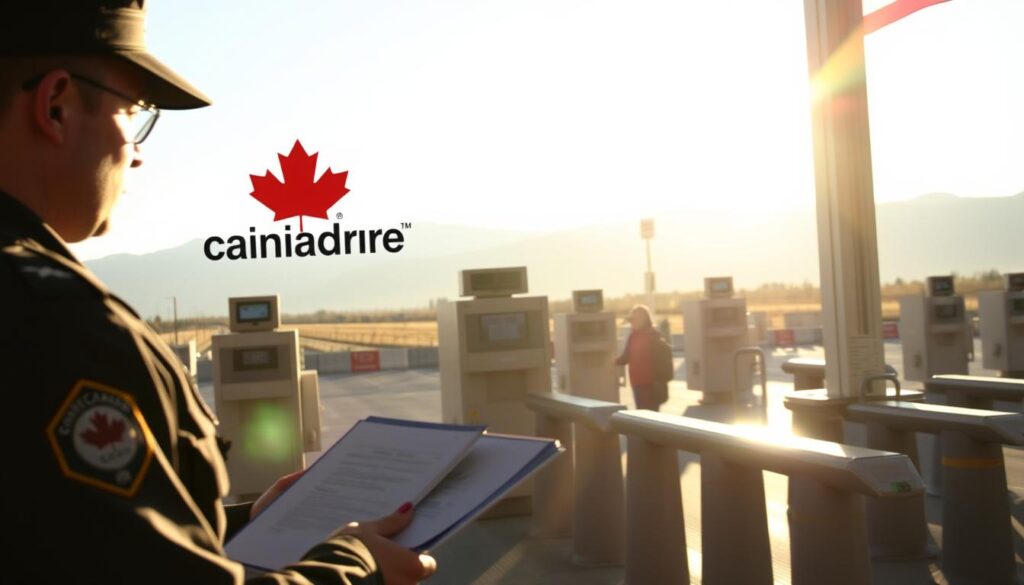
By using the right procedures and sticking to Canada Border Services Agency standards, your business can legally and efficiently move controlled substances across borders.
Preventing Unintentional Export of Controlled Substances
Preventing the accidental export of controlled substances is crucial. It needs close attention to how items are packed, labeled, and checked. To stop regulated items from mistakenly leaving the country, it’s vital to follow secure packaging rules. Travelers must also pay close attention to legal advice on drug transport. This helps avoid serious consequences.
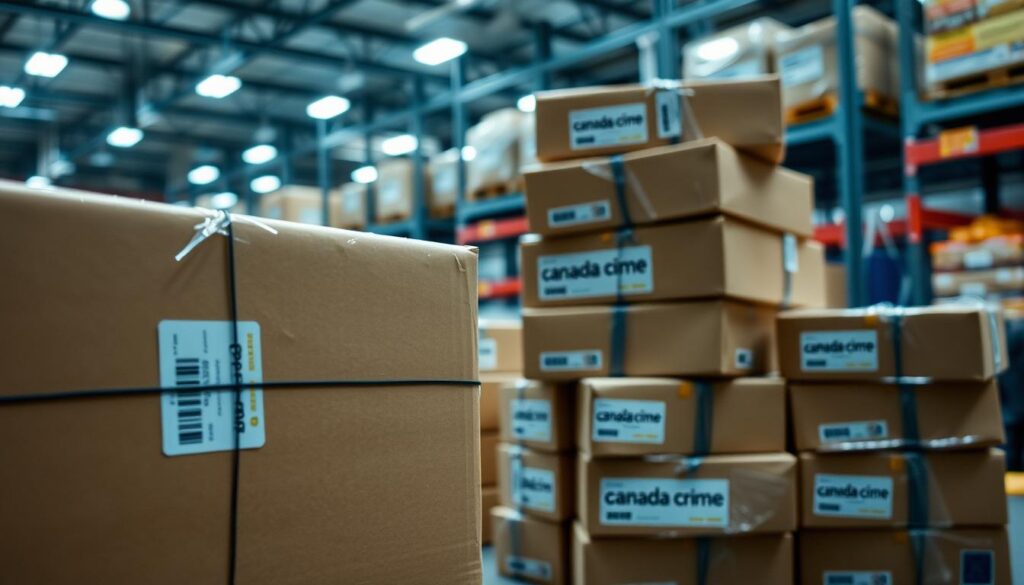
Packaging and Labeling Requirements
Packaging and labeling of controlled substances must follow strict rules. Clear labels allow customs to quickly identify what’s inside. This makes transportation smoother and reduces legal trouble. Using secure packaging methods makes sure that materials are safe. They’re also strong enough for travel without risking damage to the contents.
Checking Contents Thoroughly
Checking everything in shipments carefully is key for export control. This means making sure all items listed are allowed by international law. For instance, York Regional Police recently found $3.5 million worth of drugs. This shows why it’s so important to check thoroughly to avoid big legal problems. For more details, check this comprehensive report.
| Total Value of Confiscated Items | Charges Laid | Individuals Charged | Arrest Warrants Issued |
|---|---|---|---|
| $3.5 million | 78 | 15 | 2 |
Traveler Precautions
Travelers need to be extra careful about what’s in their luggage. A small mistake can lead to big legal problems. This highlights the importance of knowing the legal advice for carrying drugs. Before going abroad, review and follow all relevant laws carefully. Make sure your belongings don’t include anything illegal that could cause trouble in other countries.
Role of Licensed Dealers and Pharmacists
Pharmacists have big roles in handling medicines, including destroying unwanted drugs and following the law. They, along with licensed dealers, must stick to strict rules. These rules help stop drug abuse and keep everything legal.
Destruction of Post-Consumer Returns
Pharmacists must safely destroy returned medicines. These drugs should be kept in secure containers that people can’t see into or open easily. They can destroy these drugs themselves or hand them off to licensed dealers approved by Health Canada. This keeps drugs from being misused.

Licensed dealers and pharmacists must follow all laws when disposing of drugs. They also need to quickly tell Health Canada if drugs are lost or stolen. Dealers have 72 hours to report thefts, and pharmacists have 10 days. For more info, check the Health Canada website.
Record Keeping for Controlled Substances
Keeping detailed records is key for pharmacists to follow drug laws. They must note how and when they destroy drugs, the container’s ID, and how many they got rid of. This makes sure everything is clear and accountable. Dealers have to keep these records for at least two years.
| Action | Timeline | Responsible Party |
|---|---|---|
| Report Loss/Theft | Within 10 days of discovery | Pharmacists |
| Report Loss/Theft | Within 72 hours | Licensed Dealers |
| Retention of Records | At least 2 years | Licensed Dealers |
By doing these tasks, pharmacists and licensed dealers keep drugs safe and follow the law. This helps take care of public health. For more details on what pharmacists should do, check the Health Canada site.
Techniques to Deter Illegal Drug Shipments
Stopping drug trafficking is key for keeping our nation safe. One top way to fight this is by checking places where goods enter or leave randomly.
Technology is a big help in fighting drug smuggling. Using high-tech scanners helps find drugs hidden in containers. Also, having drug-sniffing dogs at borders has been effective in finding illegal drugs.

These methods make it tough for traffickers to get drugs through. Here’s a table showing different ways to stop drug trafficking and how well they work:
| Strategy | Description | Effectiveness |
|---|---|---|
| Random Inspections | Unscheduled checks at borders | High |
| Advanced Scanning Equipment | Use of high-tech scanners to detect hidden drugs | Very High |
| Drug-Sniffing Dogs | Canines trained to detect illegal substances | High |
Using these methods boosts our fight against drug smuggling. It makes our strategy against this worldwide problem stronger.
Global Export Regulations and Avoidance Strategies
Following international drug laws closely is key to exporting controlled substances legally and safely. Since rules vary from country to country, understanding the specific regulations of each is essential. Keeping up with global drug rules by learning and talking to authorities reduces risks in drug exports.
Regulations Across Different Jurisdictions
Different countries have their own rules for exporting controlled substances. For example, the United States has strict laws enforced by the Drug Enforcement Administration (DEA), while the European Union follows guidelines from the European Medicines Agency (EMA). Knowing both global and local drug laws helps you ensure your exports are legally compliant.
Best Practices for Global Compliance
Here are some key steps for keeping drug exports compliant globally:
- Regularly train your staff on the latest global drug regulations.
- Get advice from lawyers who know a lot about international drug laws.
- Use compliance management systems to keep track of legal changes.
Following these steps will improve your company’s image and prevent legal problems.
Resources for Staying Informed
Finding current information on regulations can be tough. But, there are ways to help:
- Sign up for newsletters from agencies like the DEA, EMA, and Health Canada.
- Use databases and software for immediate updates on drug regulation changes.
- Be part of professional groups and go to industry meetings to learn about the newest compliance tactics.
Using these tools helps you stay on top of global drug export rules and quickly adjust to new regulations.

Conclusion
This article talks about how to export controlled substances legally and safely. It shows the importance of knowing the risks, like legal problems, effects on international relations, and health dangers. This knowledge helps you deal with the complexities of exporting these substances.
To do this right, it’s vital to know what the controlled substances are and the laws in different places. Using secure storage, keeping strict records, and following customs rules are key. Licensed dealers and pharmacists have to be very careful. They need to destroy any drugs returned by customers and keep detailed records.
Lastly, it’s very important to follow global export laws and use smart strategies to avoid illegal drug trafficking. This guide helps your business stay away from big fines and helps fight against illegal drugs. Being careful and informed keeps your business safe and supports health and safety everywhere.

